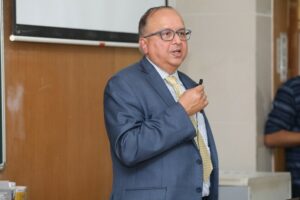An IIT Bombay education is never just about learning calculus or computer programming, though that is important. Nor is it just about getting a high CPI, which doesn’t hurt either. What I also gained from my IIT education was a range of soft skills, such as the ability to work and compete with extremely talented people, self-confidence, risk-taking, setting high standards, and never be daunted by setbacks. Some of the core aspects and elements of the coursework, such as analytical, quantitative, and computing skills are evergreen and have been critical to my growth. But the soft skills I learnt from IIT Bombay played an equally significant role in my success. The key was to combine the soft skills and the core “hard skills” and continue to adapt, grow, and succeed across a wide range of careers and career transitions.
Both Prof. S.S.S.P. Rao and Prof. D.M. Dhamdhere introduced us to the field of computing which was just beginning its explosive growth. We worked with Soviet-era computers like the 1970s vintage EC 1030 and the even older Minsk II computer systems, using punch cards. While these may seem archaic in hindsight, the skills we gained back then have lasted a lifetime.
Also, our seniors were mentors and role models too. They inspired us – whether it was during our time together on campus or when we watched them succeed at top schools like Harvard Business School or The Wharton School of the University of Pennsylvania (from where I received my MBA degree).
 Amet minim mollit non deserunt ullamco est sit aliqua dolor do amet sint. Velit officia consequat duis enim velit . Exercitation veniam consequat sunt nostrud amet. Lorem ipsum dolor sit amet, consectetur adipiscing elit, sed do eiusmod tempor incididunt ut labore et dolore magna aliqua. Ut enim ad minim
Amet minim mollit non deserunt ullamco est sit aliqua dolor do amet sint. Velit officia consequat duis enim velit . Exercitation veniam consequat sunt nostrud amet. Lorem ipsum dolor sit amet, consectetur adipiscing elit, sed do eiusmod tempor incididunt ut labore et dolore magna aliqua. Ut enim ad minim

The goal of setting up the Chair Professorship for Quantitative Finance was to eventually help create a Centre of Excellence at IIT Bombay in this interdisciplinary field which is at the intersection of finance, statistics, and technology. The quantitative, statistical, and analytical skills that students from IIT Bombay gain from their engineering and technical education can provide a strong foundation for careers in quantitative finance. These fields are important from a national perspective as well since strong, well-developed, and efficient financial markets are critical to helping India continue on its path of rapid economic development.
The Chair Professorship will help make IIT Bombay become a pioneer in the area of quantitative finance, financial engineering, and risk management using financial derivatives. Besides encouraging students to consider careers in finance and complete their coursework in this field, the chair is expected to encourage faculty to conduct research in the area of quantitative finance and initiate efforts toward the dissemination of knowledge among academicians as well as the public at large.
Much of what is taught at IIT Bombay will become obsolete or irrelevant insofar as the specifics of what is taught pedagogically. And yet, students gain some of the most important intellectual skills for a lifetime because education is all about “learning to learn.”
The Shashwat Panda Memorial Lecture will be about the skills that matter in the long term, and draw parallels to the many unique and impactful career paths blazed by IIT Bombay alumni. I plan to share insights from seven distinguished alumni of IIT Bombay ranging in graduation years from 1969 to 2008, who have built on their IIT Bombay education to become leaders in a variety of fields. These include technology, public service, government, law, central banking, and taxicab services. I will also share some of the lessons I learnt from my career path as I moved from Silicon Valley to Wall Street, which I built on the skills and knowledge I gained at IIT Bombay.
Keep learning, take risks, be a leader, and never give up even when the path seems daunting.
IIT Bombay should build upon and expand the excellent work already being done by the Dean ACR Office and IITBDRF to maintain a constant dialogue and communication with alumni. There is a lot that IIT Bombay can learn from business schools like my other alma mater, the Wharton School, which builds strong Alumni Relations Departments that are staffed with professionals who invest a lot of time and effort in staying in touch with alumni. It’s this kind of ongoing and concerted effort that can ensure that alumni feel motivated to “give back” and help the institute in many other ways.

